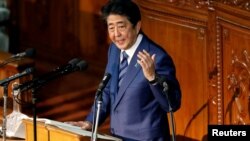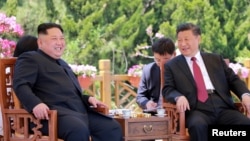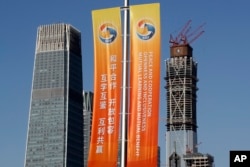China is Japan’s largest trading partner and despite meeting Chinese President Xi Jinping on the sidelines of numerous international events, Japanese Prime Minister Shinzo Abe had yet to travel to Beijing for a bilateral summit. All that changed Thursday, when the Japanese leader arrived in the Chinese capital to mark the 40th anniversary of the Treaty of Japan-China Peace and Friendship.
It’s Abe’s first trip to Beijing since assuming Japan’s premiership six years ago.
Three days in China
During the three-day visit, economic issues are expected to rise to the top of discussions, although regional security issues related to the East China Sea and North Korea will most likely also get some attention.
The Japanese leader will sit down with Premier Li Keqiang Thursday and attend a reception to mark the 40th anniversary of the treaty. He then meets Xi on Friday, which will be the first Sino-Japanese summit since 2011.
Government officials and analysts expect the three-day summit will lay the groundwork for future meetings and a potential trip to Tokyo by Xi.
In a policy speech Wednesday, Abe said, “Tomorrow I will visit China. As we unflaggingly exchange summit diplomacy, I will also deepen the exchanges between the two peoples in all levels of activities from business cooperation to sports.”
Chinese Foreign Ministry spokeswoman Hua Chunying said the bilateral summit was important and hoped that Beijing and Tokyo could move beyond the past to forge a new future.
“[We] will reconfirm that we are partners, not rivals; and reconfirm the consensus that we take each other as opportunities, not challenges; so that we could further improve and develop our ties, and at the same time deepen our mutually beneficial cooperation in all fields,” she said.
East China Sea and North Korea
When it comes to regional security issues, two of the most prominent topics for Tokyo and Beijing to discuss are competing territorial claims in the East China Sea and security concerns regarding North Korea’s nuclear and ballistic missile programs.
Jonathan Berkshire Miller, a senior fellow at the EastWest Institute, expects that Xi and Abe will “agree to disagree” when it comes to the issue surrounding ownership of islands Japan calls Senkaku and referred to as Diaoyu by Beijing.
A senior research fellow with the Japan Forum for Strategic Studies in Tokyo, Grant Newsham, also doesn’t see “any resolution, or movement towards resolution of the territorial issues in the East China Sea.”
Nevertheless, Newsham notes some positive advancements in bilateral security. He cites a recent naval exchange program agreed to by the two governments as one step forward. But when it comes to North Korea, Newsham expects nothing more than a general statement to work together to denuclearize the Korean Peninsula.
According to Miller, China’s role of implementing and maintaining sanctions on Pyongyang has traditionally been a concern for the Japanese leadership.
“I think Japan is so focused now on the U.S. and South Korea, and seeing what the Trump administration[’s approach is]” that Tokyo’s has now expanded its attention on North Korea and sanctions beyond Beijing, Miller said.
He said there’s concern in Japan about the prospect of sanction relief for North Korea without significant progress on denuclearization and the weakening of deterrence, leading Japan to stress the need to continue to maintain a united line on North Korea.
Economics to overshadow security issues
While issues related to the competing claims in the East China Sea and North Korea will be discussed, Miller expects most of the focus will be on economic cooperation initiatives, “because that is the area for good news.”
One area Miller said is worth watching is what Abe says about China’s Belt and Road initiative, especially since the establishment of a bilateral council.
“Japan has showed on a case-by-case basis that it’s willing to endorse working with the Belt and Road, but it hasn’t fully gone on board and said, ‘OK, this is a great initiative, and Japan is fully behind it,’” Miller said.
Aside from the Belt and Road initiative discussions, Newsham said the planned implementation of a $25 billion currency swap agreement between the two nations will likely be discussed.
Although Newsham doesn’t expect much in terms of concrete agreements resulting from this “feel good” meeting.
He expects a probable end result will be a “shaking of the hands and [a] vague sense that they agreed on something,” but without specific details.
However, Newsham added whatever ultimately is discussed, the outcomes won’t “lead the Chinese to change their adversarial position towards the Japanese, who they see as, the one Asian obstacle to Chinese domination of the region.”















